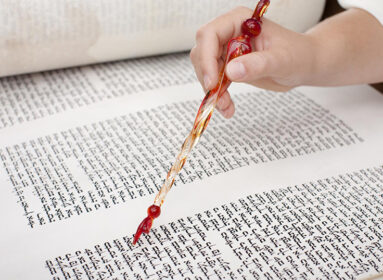
By Rabbi Tzvi Hersh Weinreb
In this week’s Torah portion, Yitro, we read of a very rich relationship between a son-in-law, Moses, and his father-in-law, Yitro. Of course, we first read of their connection much earlier on in the book of Exodus. But in this week’s portion, the relationship begins to sound much more familiar to those of us who have “been there.”
Yitro travels to meet Moses and is the one who reunites Moses with his wife and children. They converse with animation and in great detail, each one narrating his story to the other. Moses narrates the story of the Exodus, of the splitting of the sea, and of the war with Amalek.
Yitro also tells a story, but it is a very different one. He tells of his religious quest, of his search for a God he can believe in. He informs Moses that he has dabbled in every conceivable type of idol worship. He has seen it all. And “now he knows” who the true God is.
Every son-in-law tells his father-in-law his story. And every father-in-law, that is every father-in-law worth his salt, shares his narrative with the young man who requests his daughter’s hand.
I remember telling my father-in-law some of my story. I remember some of the questions he asked me, and his disappointment when he discovered that I did not share his fascination with the game of chess. But I can never forget the story he told me; not once, but throughout the more than 40 years that we knew each other. His was a story of pre-Holocaust Eastern Europe, of a culture that is no more, a culture that he never ceased to mourn.
It is no wonder that the Torah characterizes the dialogue between Moses and Yitro by the word “vayesaper,” which means to tell a story. Most relationships consist of stories told by one party to the other. In the case of the father-in-law and son-in-law relationship, these stories become essential and, at least in my case, were lifelong narratives.
Yitro models another essential aspect of this unique relationship: He offers counsel; he gives advice. Not that Moses asked for Yitro’s opinion as to how he should conduct the judiciary system for his people. But Yitro assumed that it was his prerogative as a father-in-law to gently and constructively find fault in his son-in-law’s approach to things and offer reasonable alternatives.
I number myself among those fortunate sons-in-law whose father-in-law did not hesitate to occasionally criticize him, but who did so lovingly. He offered wise and practical suggestions which indeed were often drawn from his own past and sad, personal experiences.
It has been pointed out that the Hebrew word for a son-in-law is chatan, a bridegroom. I am convinced that this is because in the relationship between son-in-law and father-in-law, the former always remains the young bridegroom and the latter, the sage elder.
In the end, Moses asks Yitro to remain with him, the ultimate tribute that a son-in-law can pay to his father-in-law.
I would like to close with an original thought, and if it is theologically daring, or in some other way off the mark, I beg the reader to forgive me.
It is a truism that God is our Father, and we are his sons and daughters. It strikes me that, in a certain way, God is also our Father-in-Law.
God as Father is the God with whom we began a relationship in our infancy. God as Father-in-Law is the God whom we freely choose, sometimes repeatedly, at later stages of our lives.
God is also our Father-in-Law because we have taken, so to speak, His daughter as our bride. The Torah has been described by prophets and rabbis as God’s daughter. And we, who have accepted the Torah, are betrothed to the daughter of God Himself. He entrusted His beloved princess to our inadequate and unreliable care.
But we asked for her hand. We accepted the Torah and committed ourselves to “doing and listening” to her words. If we are faithful to the Torah, we are demonstrating to our “Father-in-Law” that we deserve His daughter.
Only then we can claim a close relationship to Him, closer even than the relationship I had with my father-in-law, may he rest in peace.
Rabbi Tzvi Hersh Weinreb is executive vice president, emeritus of the Orthodox Union.








 Southern New England Jewish Ledger
Southern New England Jewish Ledger










